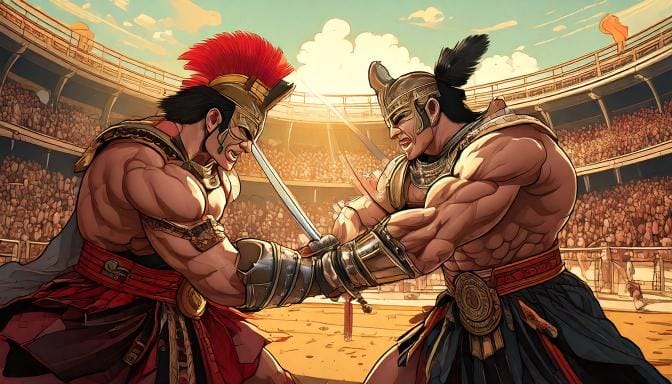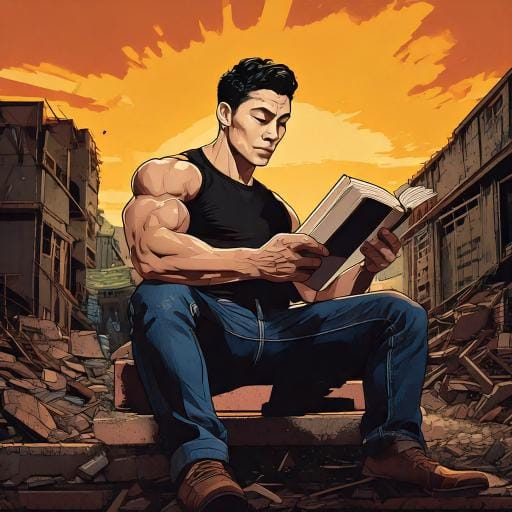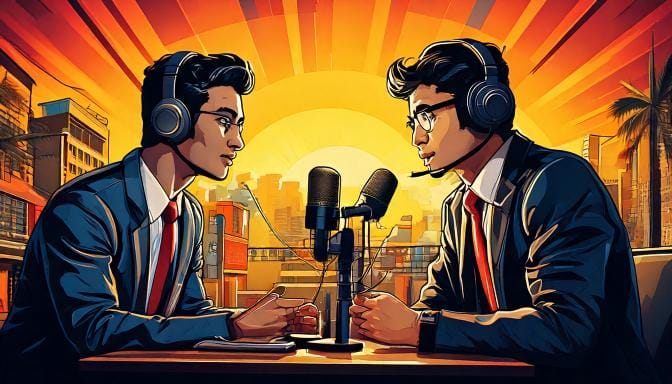In Pursuit of Intellectual Athleticism

I have left Enterprise Singapore for a month and a half.
This is my first month without the sweet taste of a stable paycheck. The sweet high of ‘striking it out’ on my own and the barrage of congratulatory messages have since subsided.
In short, I am officially embarking on the ‘hard part’ of my entrepreneurial journey.
I am writing this blog post as a public implementation of my Odysseus Pact.
Just as Odysseus bound himself to the mast to resist the Sirens' temptation, I need to impose a constraint on myself to focus on building out The Front Row Podcast.
Pursuing Intellectual Athleticism
The point of leaving a stable job and a steady income was to buy myself time to become intellectually athletic.
For the longest time, I couldn’t articulate this.
I wanted to be smarter, wiser, or more knowledgeable. But, the nouns didn’t seem to correctly map onto what I had in my mind.
But one day, as I rewatched the Last Dance documentary, the term ‘intellectually athletic’ clicked in my head.
There was something beautiful about Michael Jordan's singular obsession with winning championships. He was demanding of himself and his teammates, wanting to squeeze every ounce of greatness from what he was given.
This was what I wanted to do with my mind.
Revisiting Athleticism

The root word of "athletic" is "ethnos" (ἆθλος), which comes from Ancient Greek. This word means "contest" or "feat." Therefore, "athlete" refers to a competitor in physical contests.
This Greek root gives us insight into the core purpose of becoming athletic —to succeed in competition.
There are a few defining differences between an athlete (even serious amateurs) and an average person:
- Winning. The athlete wants to win. No serious athlete goes into a game thinking they would lose. Even if the odds are stacked against them, they condition themselves mentally to think they could still win. The layperson cares about fun. Winning is the perk, not the goal for them.
- Dedication and Discipline: Athletes commit to their craft seriously. They often train intensely, follow rigorous training regimens and adopt lifestyle choices to support their aim of winning. They care obsessively about their skill development and physical condition. The layperson incorporates the sport around their lifestyle.
- Structure. An athlete cannot afford to dabble in their sport. They need to excel in it. They deliberately practice difficult skills that will differentiate them from their competition. They don’t wing it. It is out of structure that creativity is born. (Here's a clip of Stephen Curry, NBA's greatest 3-point magician practicing three-pointers. See the secret?)
These qualities, when combined, are what set athletes apart.
*As an aside: Why not the analogy to the entrepreneur/artist?
Sports provide an apt analogy because they can be pursued either as a leisure activity (amateur) or as a profession (pro). The stakes of competition are also much higher in sports. Nowhere else is the dichotomy of the amateur and the pro clearer.
Intellectual Athleticism

The dimension of striving to win is lacking in a general aspiration of being smart.
To be intellectually athletic is to compete competently in the world of ideas.
To win in the long run is to provide original insights that others would find interesting and practically meaningful. (At the same time, to win is to be sufficiently financially rewarded)
It also means that one must live like an athlete. I must pay attention to the food I feed my brain, the obligations I allow in my life, and my attitude towards knowledge acquisition.
My training regimen is simple: I force-feed myself insightful books, take copious notes (and publish them), and interview deep thinkers.
Rinse and Repeat.
I suspect I will need to increase the complexity of my training regimen as I grow. I hope to put myself through structured learning sooner rather than later. (I will probably publish my protocol in a future blog post)
Building Intellectual Athleticism Through Podcasting

A podcaster's default (and most financially lucrative) path is to transform into an internet personality. Depending on your subject matter, the time to escape velocity will vary.
The more casual and fun your podcast is, the larger your TAM will be and the easier it will be to build your following. Thus, it is no surprise that popular podcasts tend to be casual in flavour in a small market like Singapore. Naturally, in Singapore, content easily converges with what monetises well.
The downside is that your intellectual growth plateaus quickly as you will optimise your episodes for maximal views instead of learning.
I am trying to play a different game.
I want to continuously deepen my understanding of the ideas shaping our world and the diverse cultures and economic forces driving Singapore, Asia, and the world. The good thing for me now is that many of the great thinkers and ideas in our orbit are underpriced in the media ecosystem.
This mispricing might mean that the podcast grows slower because many of the guests are not public figures. But I think it gives me time and latitude to explore their ideas more seriously. This also means I can easily access some of the brightest minds the world has to offer.
The format of the podcast gives me real-time feedback on whether I am maturing intellectually.
Simply put, the podcast is my forcing function.
It’s easy to yap about your favourite food, but it’s ten times harder to discuss, say, COVID policies, in a nuanced and insightful manner.
It would force me to do as much research as I can so that I can hold an hour-long conversation that is both interesting and stimulating for the listeners.
If I can stay focused, I can generate substantial intellectual alpha.
In the next year, I want to become a competent interviewer who can 'hang in the ring' with intellectual heavyweights.
Why I Focus on Asia

Many mainstream podcasters have been interviewing experts in every domain for years.
However, they primarily cater to a Western audience, meaning their guests and assumptions are primarily Western.
If you are an American podcaster, what are the chances you will interview someone equally interesting from the other side of the globe?
When ideas from different domains or cultures interact, an implicit "exchange rate" is at play. Some ideas might be seen as more valuable or influential, commanding a higher "exchange rate" in the marketplace of ideas.
Right now, ideas primarily flow from the West to Singapore. Homegrown or even regional ideas suffer from illiquidity and are thus often undervalued.
(By illiquidity, I mean excellent ideas that, for some reason, do not flow out well into the marketplace of ideas. The best example I can think of now is the lessons from the life of S. Rajaratnam. For a man who has defined much of Singapore's history, reception to his latest biographies appears to be lukewarm at best.)
The wonderful thing about the Internet is that it evaporates geography. This means that it's much easier to export great ideas from our part of the world.
As Patrick Collison, the co-Founder of Stripe, describes podcasts, "Increasing the catalytic surface area of certain kinds of information is a valuable thing in the world"
Podcasts can help make Singaporean and Asian ideas more liquid.
Kishore Mahbubani, in a 2020 Economist article, highlights a coming shift in where we draw ideas from:
The deference to Western societies, which was the norm in the nineteenth and twentieth centuries, will be replaced by growing respect and admiration for East Asian ones. The pandemic could thus mark the start of the Asian century.
I take this thesis seriously, and it is my mission to accelerate this transition. By that, I don't mean adopting an anti-Western view. I aim to diversify our collective intellectual portfolio.
As such, I will try to choose guests who:
- deeply understand their relevant slice of Asia and/or
- have fertile ideas for Singapore (and the region)
- help me learn a ton during the prep*
In Singapore, we are so far from the Pareto Frontier in podcasting that I will resist the temptation to niche down immediately.
I would also love to choose people who deeply understand Asia in their domain of expertise. (As a Singaporean, I am also naturally inclined to excavate hidden insights within my country)
On a more selfish note, the fact that many of my guests are currently underpriced means I can tap into this arbitrage opportunity. Wouldn't it be cool to be the person who mainstreamed certain people? I certainly wouldn't mind the cultural cachet of uncovering or mainstreaming great minds! It's also an easier game to play!
I know I can't be the Lebron James of Podcasting, but I can certainly aspire to be the Yao Ming in the industry.
*Dwarkesh Patel’s Razor on choosing guests: "I choose guests not based on whether I want to spend two hours chatting with them, but whether I would learn a lot by spending two weeks preparing"
Studying The Craft
The way I grew up, from Tex Winter to Phil Jackson, the way film was broken down - it was broken down to the smallest detail. It was broken down to the right angle, it was broken down to foot placement, timing, looking at the posture of a teammate. You know, what could he be thinking, what could he be feeling? - Kobe Bryant at USC, 2018
Outside of reading deeply and hosting podcasts, studying the trailblazers in this space will be useful. After all, athletes study game tape, right?
This is not exhaustive, but I thought it would be worth sharing.
| Podcast | By | What Sets The Podcast Apart (IMO) |
| Endgame | Gita Wirjawan, Former Minister of Trade for Indonesia | 1. He is a champion for ASEAN and Indonesia, putting the spotlight on people he thinks are crucial for his country. 2. He is a thoughtful thinker in his own right 3. Mixes up Bahasa and English Podcasts really well |
| Conversations with Tyler | Tyler Cowen | 1. Tyler is extremely intellectually rigorous and asks his unconventional questions 2. Diverse guest selection from various academic and professional backgrounds 3. Explores ideas in economics, culture, and society |
| Dwarkesh Patel | Dwarkesh Patel | 1. Extremely well-read and extensively researched for a young person 2. True believer in podcast as an idea propagation machine |
| Acquired FM | Ben Gilbert and David Rosenthal | 1. Audio book-length deep dives into companies 2. Extremely well-researched on playbooks of world’s greatest companies (They force feed themselves with knowledge) |
| Founders Podcast | David Senra | 1. Insight-rich podcast on the world’s greatest founders. 2. He has an uncanny ability to distil the gems from biographies and life lessons of founders |
| Diary of A CEO | Steven Bartlett | 1. He is able to connect with his guests emotionally (which is huge if you want to get their true thoughts and not just a PR answer) 2. Obsessed with improving production quality |
| Modern Wisdom | Chris Williamson | 1. Conducts Superb Virtual Interviews 2. Excellent packaging ideas with beautiful wrappers 3. Making Podcasts Cinematic 4. Gym bro that does podcast but does not come off as a douche |
Do you have any recommendations I should consider? Let me know.
(I restrict myself to video podcasts here because I am publishing a video-first podcast)
Thank You To The Believers
This is a bet that I am taking on the idea that we are sitting on a treasure trove of intellectual gold waiting to be uncovered.
I am putting serious skin in the game by putting my 100% into producing these podcasts.
Athletes only make it through because they have supporters, who were there since Day 1. (It means the world to me that each of you is still subscribed to me because you are my day ones!)
Thank you for supporting me and adding fuel to my fire.